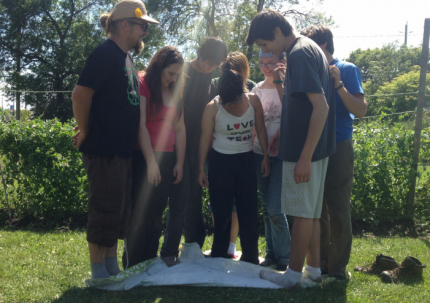Ont Ag Week Series: Roots to Harvest on Engaging Young People in the Food System
Posted: October 7, 2016
Categories: Edible Education Network / GoodFoodBites / News from Sustain Members

photo from Roots to Harvest website
Sustain Ontario is celebrating Ontario Agriculture Week by talking with some of our valued members about the importance of agriculture and the impact of their work in the province.
For our next #OntAgWeek Series blog post, we spoke with Erin Beagle, Executive Director of Roots to Harvest, a not-for-profit in Thunder Bay that provides transformative educational opportunities for youth to engage with local agriculture and cultivate healthy communities:
Why does Agriculture matter to Ontario?
E.B: Agriculture is so important to Ontario – it’s a major piece of our landscape, of caring for the environment, of making communities well-rounded and full, and the economic impact is huge. It allows us to have our food close to home, and to be self sufficient. For the economy, communities, family farming, the environment, and connecting our resources to our land – Agriculture is part of the fabric of our country.
What does Roots to Harvest bring to the agricultural landscape of Ontario?
E.B: Roots to Harvest works closely with bridging the urban and rural. We provide opportunities for those from an urban landscape to experience the rural landscape, and to see the different scales and daily work ethic behind them, and the work ethic that goes into growing food.
We bring this important connection to youth and youth institution like schools, having these places embrace agriculture, in their mandates and prioritized in their goals. It brings a real food culture to their schools.
We really work in Thunder Bay to translate between urban and rural, on both sides, increasing access to both in the community, so people can experience local food and agriculture in an urban setting, outside of other traditional settings like farmers’ markets.
How can youth education help improve our food and farming system?
E.B: Youth education is really, really important. We approach youth education by looking at it from an experiential point of view, particularly with high school students.
Food literacy is certainly a part of it, but students need to know more than just where their food comes from, and how to prepare it – they also need to understand other aspects, like the work that goes into making all this happen. What does it take to get all this to happen? How is food grown, in what capacity, the seasonality, what are the challenges? How do we approach these decisions, in terms of caring for the land, and in a sustainable way? A key part for Roots to Harvest is connecting young people to all these realities. For instance, there’s a shortage of new farmers in our province and country, and opening this up to students as an actual reality out there is important.
Unless you grow up on a farm in Thunder Bay, which isn’t the reality for most people around here, there isn’t really a way you’d experience this language or this scale of growing food; there’s no post secondary education around here in food and farming. So we play a big role in that education, in not just increasing food literacy, but connecting young people to the realities of growing food in Ontario, and the opportunities and potential that exist.
Thank you to Roots to Harvest for taking the time to chat with us about the significance of connecting youth to our food system during Ontario Agriculture Week!
